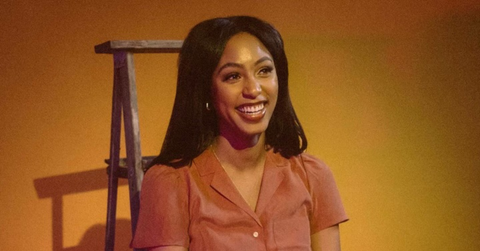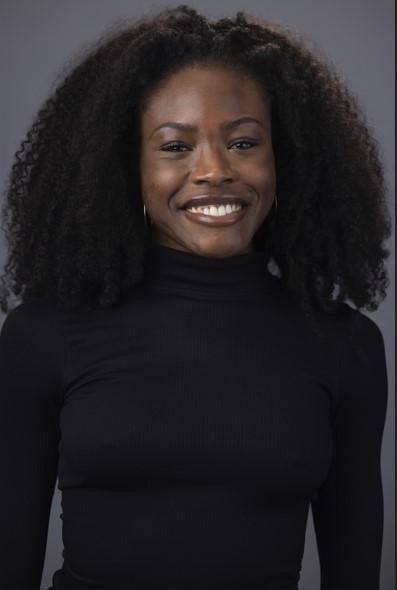Cree Myles, a Webby-nominated writer and book influencer, created and runs the Penguin Random House vertical All Ways Black. This platform aims to uplift Black authors and readers who love their work. She hosts Instagram Live interviews with notable authors such as Ta-Nehisi Coates and Amanda Gorman, and brings attention to the disservice banning books does to young Black readers. Cree’s accomplishments include winning The Cr8tive House’s 2024 Make Art award, hosting Penguin Random House’s “Baldwin 100 Podcast,” and writing about books for Elle, The Mary Sue, and Afropunk.
Her Agenda sat with Cree to learn more about how Black authors and stories have impacted her work, the belief in herself to conquer and disrupt spaces, and how reading works by phenomenal Black women have added to her confidence and drive.
Her Agenda: When did you first sense a gap between folks, particularly Black folks, and reading?
Cree Myles:I wouldn’t say that there’s a gap between Black people and books. I think the gap is really between the people who make the books and who they ask to write the books, who they give money to write the books to, and how books are promoted that would pique the interest of Black and Brown people. I think as I’ve been in the digital book space, that was something that [I] noticed instantly. I started in 2017-ish, and it was very white and apolitical. It didn’t feel like a space where Black people or Brown people were being prioritized.
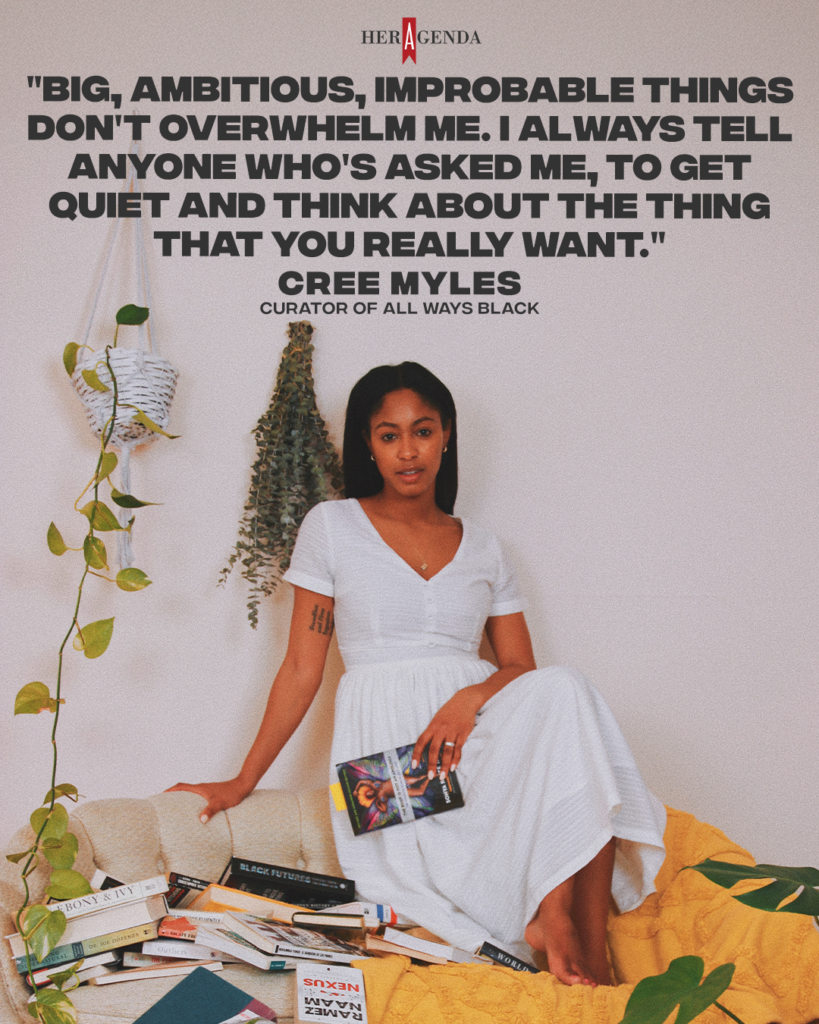
Her Agenda: Was this what made you want to start the Black Like We Never Left book club?
Cree Myles: It wasn’t a deficit-based interest. It was more that I was really excited about Toni Morrison. I had read her first when I was 18. They had us as seniors reading Beloved, which just flew over my head. I was really protective of her because she was the only Black woman that we were reading in my Lit class. I tried her again in my early twenties [and] I read The Bluest Eye, and I was like, ‘Oh, this is what the hype is about. This is a masterpiece.’ So, it really was me realizing that literally my mother had not read The Bluest Eye and I was like, ‘Oh, we need more people, Black women specifically, to know about this.’
Her Agenda: Partnering with Penguin [Random House], being asked to curate the All Ways Black initiative, and run the All Ways Black Instagram account, how did that help expand your mission to promote Black authors, the dynamics of Black stories, and share the wealth of what you were learning from getting reintroduced to reading these stories?
Cree Myles:The Bluest Eye was my entry point into reading again. I read that Zora Neale Hurston, Alice Walker, and Angela Davis for some nonfiction razzle-dazzle, and then I sprinkled in Zadie Smith and Ta-Nehisi Coates and was like, bloop, there’s the Black Literary Canon. [But], as I have delved deeper into this work, I’ve realized what a short sighted view that is. Despite the fact that our society often picks one Black writer to put on a pedestal, there are a multitude of Black writers who are riding the canon all the time. Robert Jones Jr.’s, debut novel, The Prophets, was a book that needed to be included in the Black Canon and it was written in the past four years. That’s really been the most exciting thing to me. The level of literature that is still being pushed out by people who are still alive – there are no good old days. All the days are good in [the] Black literary world.
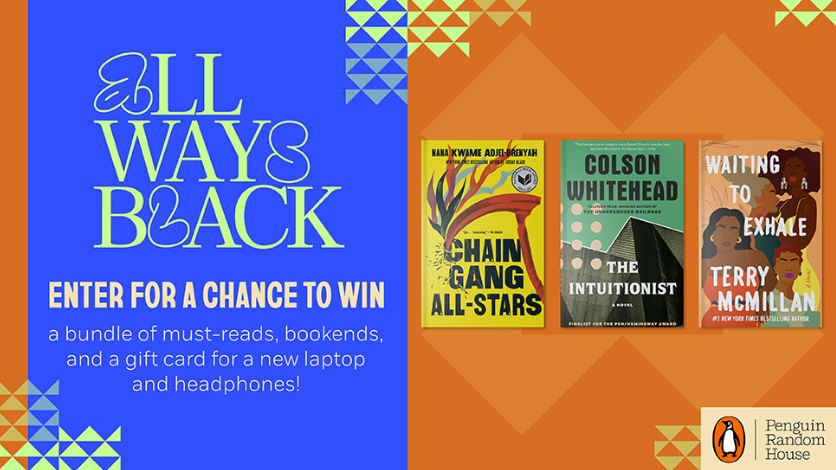
[Editor’s note: We’re partnering with All Ways Black & Penguin to host a giveaway! One lucky winner will have a chance to win a collection of must-have books from some of our favorite authors, a pair of beautiful bookends from Lichen, and a gift card to purchase a new laptop and headphones. Enter for a chance to win. NO PURCHASE NECESSARY. US Residents, 18+. Ends January 30, 2025. See Official Rules at https://bit.ly/3MJkStg]
Her Agenda: [In an NPR] interview you did a couple of years back, you told them reading Ta-Nehisi Coates’s Between the World and Me really helped you emerge as a new person. What elements of your upbringing were affirmed through reading this book and more stories from Black authors?
Cree Myles: I don’t know if it was affirming or unlearning in a lot of ways. I was raised by traditional parents, they were born in the 60s. Very [much] like respectability politics will save you. You will go to school, you will get degrees, you will wear your hair in a way that is comfortable. All of these things that, unbeknownst to them, [were] centering whiteness and the white gaze. So, to be reading books that were written a hundred years ago and Black women were really just like, ‘F*ck the white gaze,’ I was like, ‘Oh, I’m allowed to do that because this has actually been happening for a really long time.’
One of my favorite things about Ta-Nehisi Coates as a whole person is [his] writing bites, but I feel like he puts it there so that [when] he interacts with people, it’s a much more casual thing. I found that in a lot of writing that [pushes] us toward liberation or freedom when I meet writers who have written hard things or controversial things, they seem more at rest as they move around the world. They’re not really holding it in the way I think a lot of other people are.
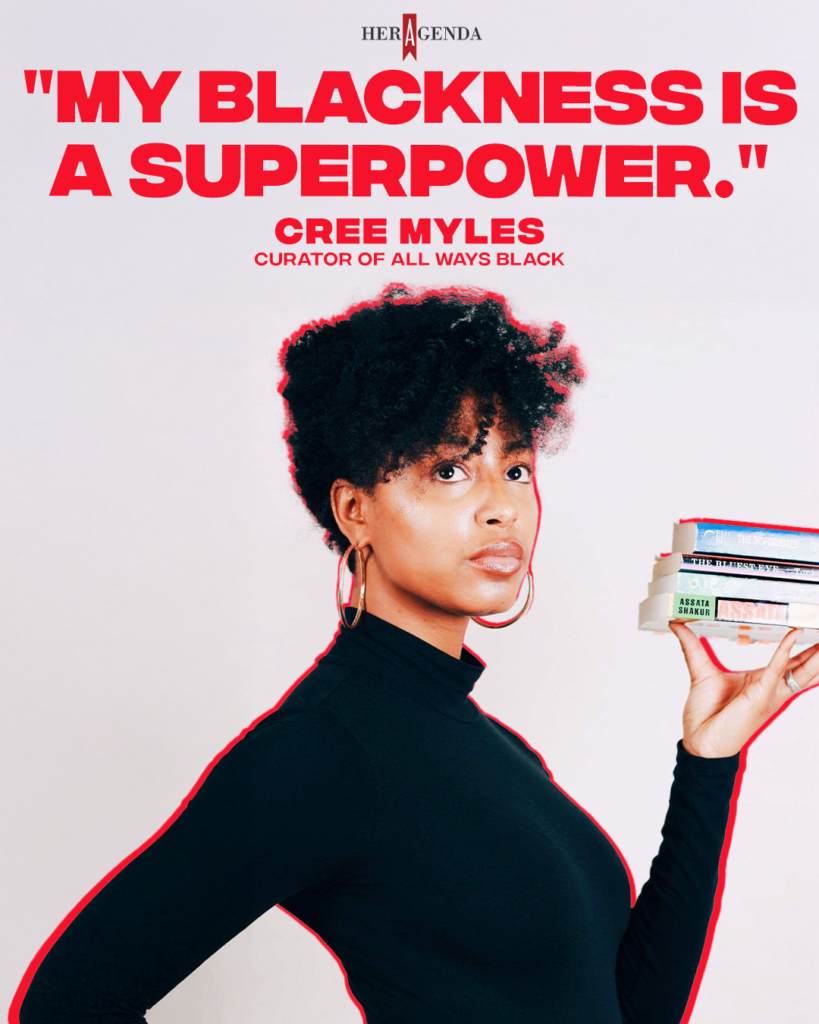
Her Agenda: Was there [a] specific book or an author that made you feel the most liberated from your upbringing?
Cree Myles: This is so cliché, as me being a 35 year old millennial, but it really was Sister Outsider, “The Transformation of Silence Into Language and Action.” I read that essay and then circled back on conversations that had been closed for like two years, and I was like, ‘Oh, I also need to let you know [to] never do that again.’ I’ve printed it out, and it’s hanging up in my house. I listen to it before I have to do anything that scares me a little bit. I would say these affirmations before I had to do something kind of scary and then listen to “The Transformation of Science Into Language and Action.” I did that so hard for two years that I don’t even have to do it anymore. It’s inside of me. Shout out to Audre Lorde, she freed me.
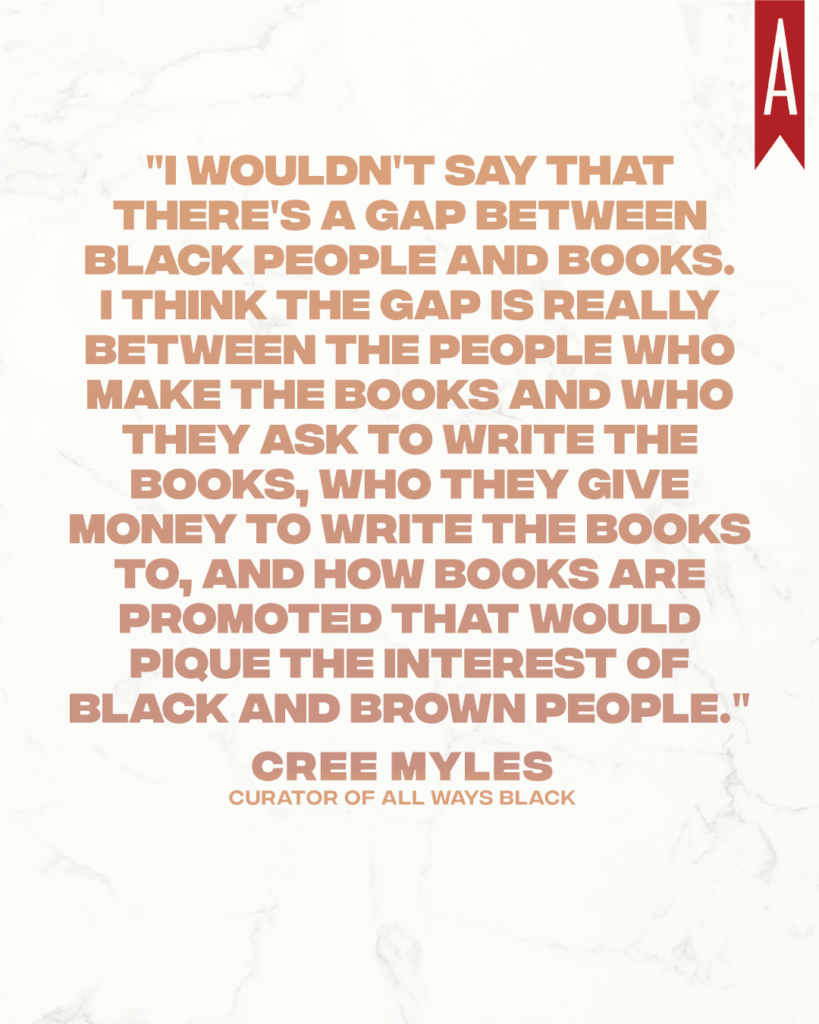
Her Agenda: Something that [we] find really dope about All Ways Black is that the name really points to how the Black experience is very dynamic. There’s the Black American experience. There’s the African American experience. There’s the Caribbean American experience. Through reading and curating this platform, what have you learned about other aspects of the Black experience?
Cree Myles: I’ve learned that there are very nuanced experiences within Blackness that we have because of the diaspora, and to be mindful and to respect it. They’re deep parts of our identity. The shared experience is also there. Something will happen, and it feels like a digital glance across the way. Black is universal. I don’t know if it’s the way that we’re treated or the way that we filter things, but sometimes it is.
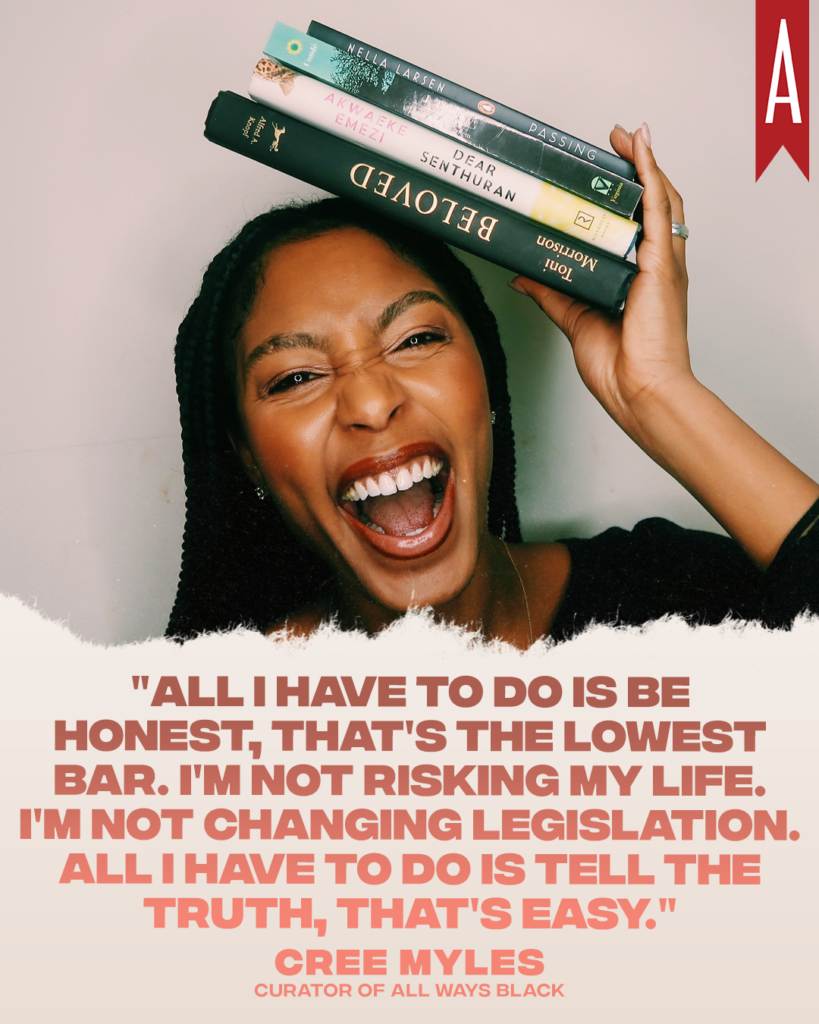
Her Agenda: You told Essence some time back that you knew that you would get paid for reading books one day. What about yourself made you think that was possible?
Cree Myles: I have a crazy power complex, so part of it was that. I [need] to conquer stuff. I go into the digital space, and I’m like, ‘Ugh, first of all, this is whack. Second of all, what y’all are doing is not even interesting.’ And then I was like, ‘Who runs this place? Oh, Penguin Random House? Bet.’ That’s how my brain works and I really liked the aspect of digital curation and influencer culture. What I would consider one of my gifts, my husband always jokingly says that I’m a professional fan. If I love something, I am insufferable about it. I’m reading Dracula right now, [and it’s a] masterpiece. I will talk to you about Bram Stoker until I throw up. It’s easy for me to love something that I think deserves love.
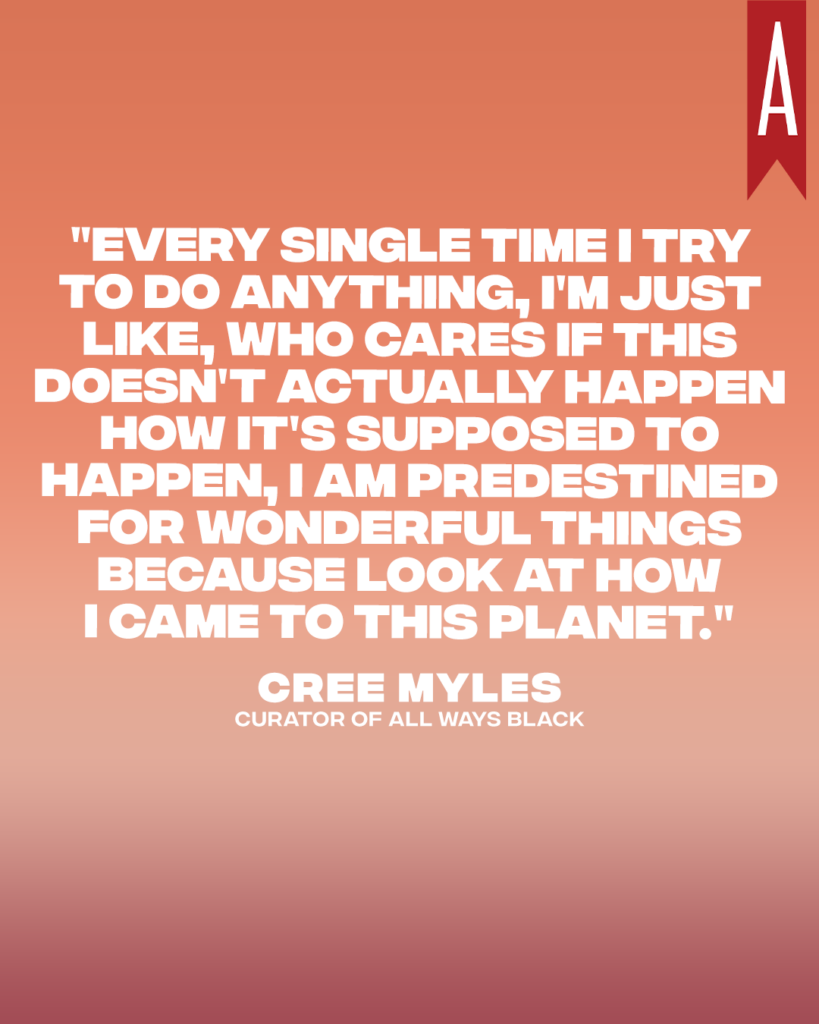
Her Agenda: What books are you currently reading right now that you recommend?
Cree Myles: [I] am reading Dracula [and I] love it. It should be required reading. Once I realized it was an allegory for colonialism, I was hemmed up so bad. I’m even looking at master’s programs right now, and I was just going to do American literature, but I was like, do I need to go do Irish literature?
This comes out on February 11th, but it’s called Original Sins by Eve Ewing. I finished that last week. It is a straight line [to] the receipts on why the public education system regularly and systemically fails native and Black children. She literally starts us with Thomas Jefferson. Those are where the receipts start, and it’s 400 pages of [receipts]. It’s wonderful. National Book Awards if you’re hearing this, for your consideration. I was [also] reading Sky Full of Elephants by Cebo Campbell before I had to start reading Dracula because I’m reading that with some friends. [It’s] also great. That’s his debut [and] it’s really wonderful. The Message by Ta Nehisi Coates. I feel like everyone has read that by now. [I] can’t speak highly enough [about it], It’s exactly what we needed.
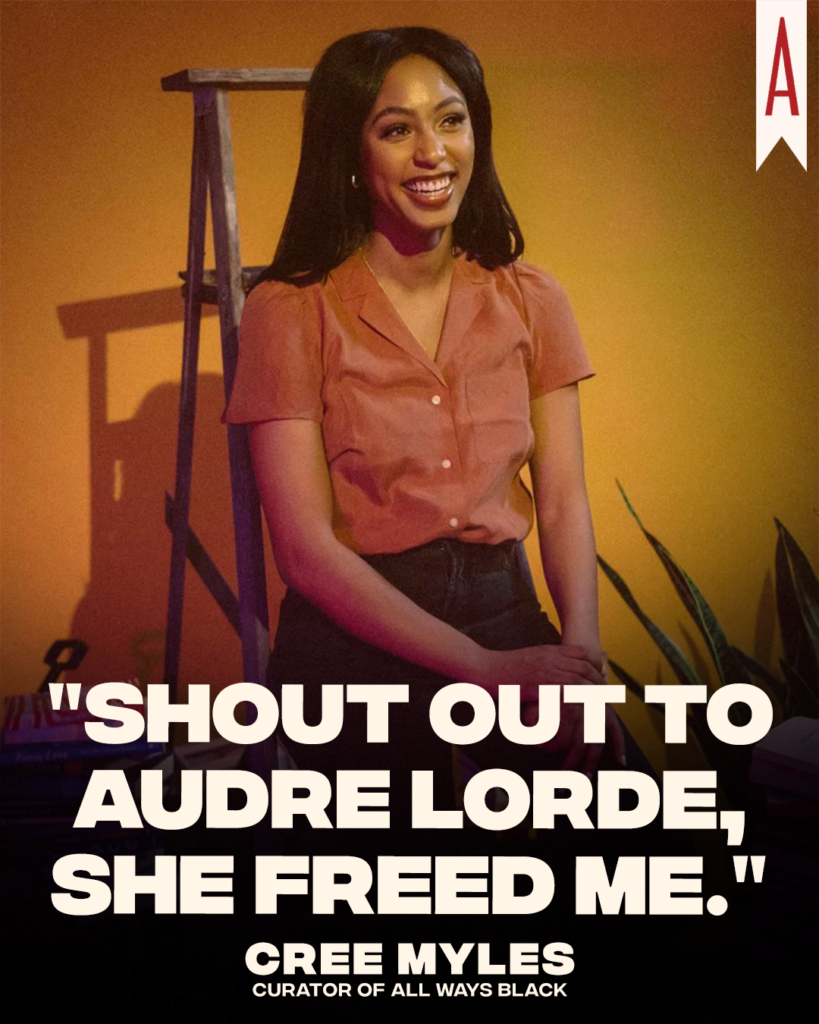
Her Agenda: We’re in a period of time where a lot of books are being banned. With All Ways Black and you continuing to promote books that have been banned, why is that so important in this period of time?
Cree Myles: It’s so wild to me that we have to deal with this and have these conversations. They’re important. They are as important as any of the stories that aren’t being banned, perhaps more important. I saw myself so vividly through The Bluest Eye and my high school banned that book last year. If there’s a little Black girl walking around Menomonee Falls, like me and there were. I went to this suburban school in Wisconsin, [it was] like 2% Black [and] I was a token Black girl. They put me on the cover of everything because I ran track, won things, and got good grades. It was lonely, and I was really cosplaying [in] a lot of ways because everybody around me [was] like [an] Abercrombie girl. Deep in my soul, I didn’t know yet, but I needed Solange, where was she? The clarity that [I] gained through seeing stories where all of the nuanced, Black girl experiences are pulled apart in [The] Bluest Eye. I saw so many people besides myself in that book, and you just get robbed of that. Then you don’t even think that you matter because you never see yourself. That’s the internal dialogue that just starts looping in your head when you get robbed of your stories. It’s criminal, especially to do it to children.
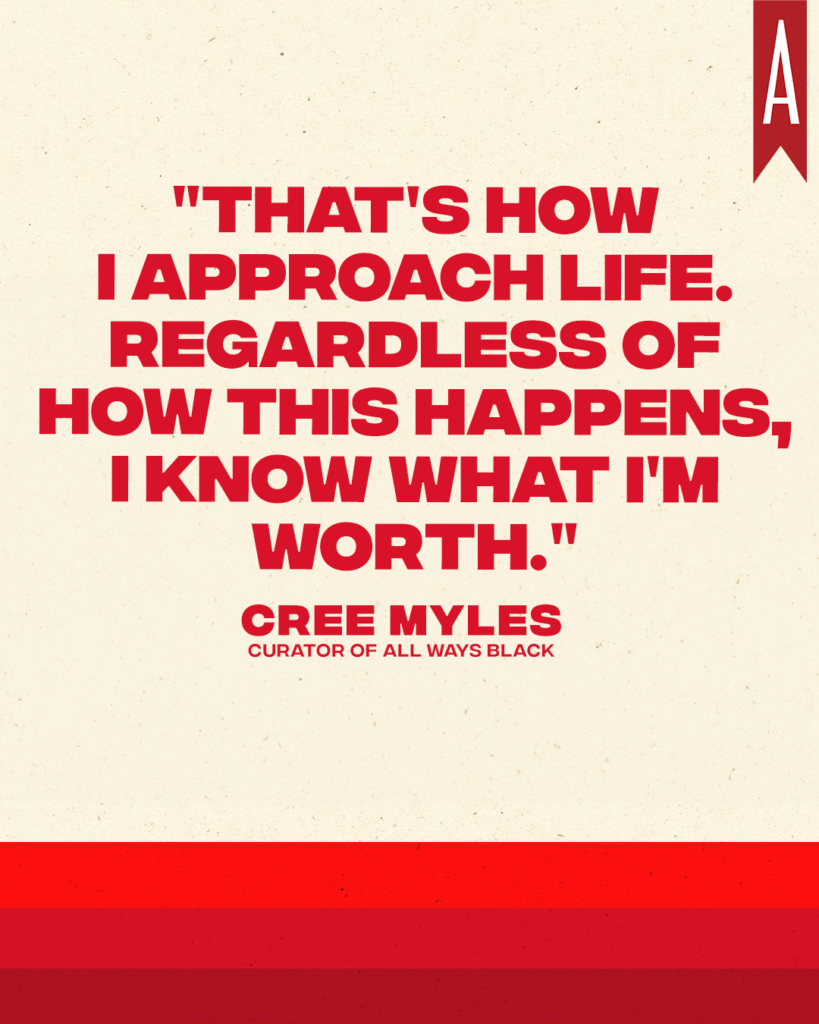
Her Agenda: With being a book influencer, being involved in Book Tok, Bookstagram, and All Ways Black, what advice would you give to any young Black woman who wants to take over a space in [this] way?
Cree Myles: Big, ambitious, improbable things don’t overwhelm me. I always tell anyone who’s asked me, to get quiet and think about the thing that you really want. You probably told yourself a long time ago that you couldn’t even have it, so you have to spend some time getting quiet to get there. Once you’re honest with yourself, you make a plan. It really was just looking at the space and seeing how I could disrupt it in an interesting way. So, that was just studying Bookstagram, in 2017, seeing what everyone was doing, and doing things differently to stand out. My 14-year-old wants to go to a music conservatory, and he wants to go to a good one [with] acceptance rates [at] seven to 10%. So, I was like, we just need to pull the stats. How often was a child who got into the Royal Academy of Music or Juilliard practicing at 14? We find out the number and then he does it. All you can do is try. The other part of it is, you can’t be tied to outcomes. Things will go wrong because that’s the creative process and you have to know that you are [who you say you are], regardless of what happens. I tell my son regardless of how many competitions he loses or programs he doesn’t get into, he is a musician. It is so. Whether you get in or not does not mean that you are or are not the thing. That’s how I approach life. Regardless of how this happens, I know what I’m worth.
Her Agenda: When you do Instagram Live interviews with Black authors, you end them by asking what their favorite thing about being Black is. So [we] want to ask you, what is your favorite thing about being a Black woman?
Cree Myles: Statistically, what were the chances of me even coming to the planet as a Black woman? It was low. But, I am a Black woman, like how Maya Angelou is a Black woman, Toni Morrison, Dominique Dawes, and Whitney Houston. These are the most phenomenal people who have graced the planet. What can go wrong? For every single time I try to do anything, I’m just like, who cares if this doesn’t actually happen how it’s supposed to happen, I am predestined for wonderful things because look at how I came to this planet. As I’m aging, the attempts to belittle [Black women] whether they are on purpose or indirect, that’s your stuff. When Zora [Neale Hurston] was like, why would you deny yourself my presence? That’s really what I’m on because it’s so lit over here. You’re just mad, and I hope that you find peace, period.
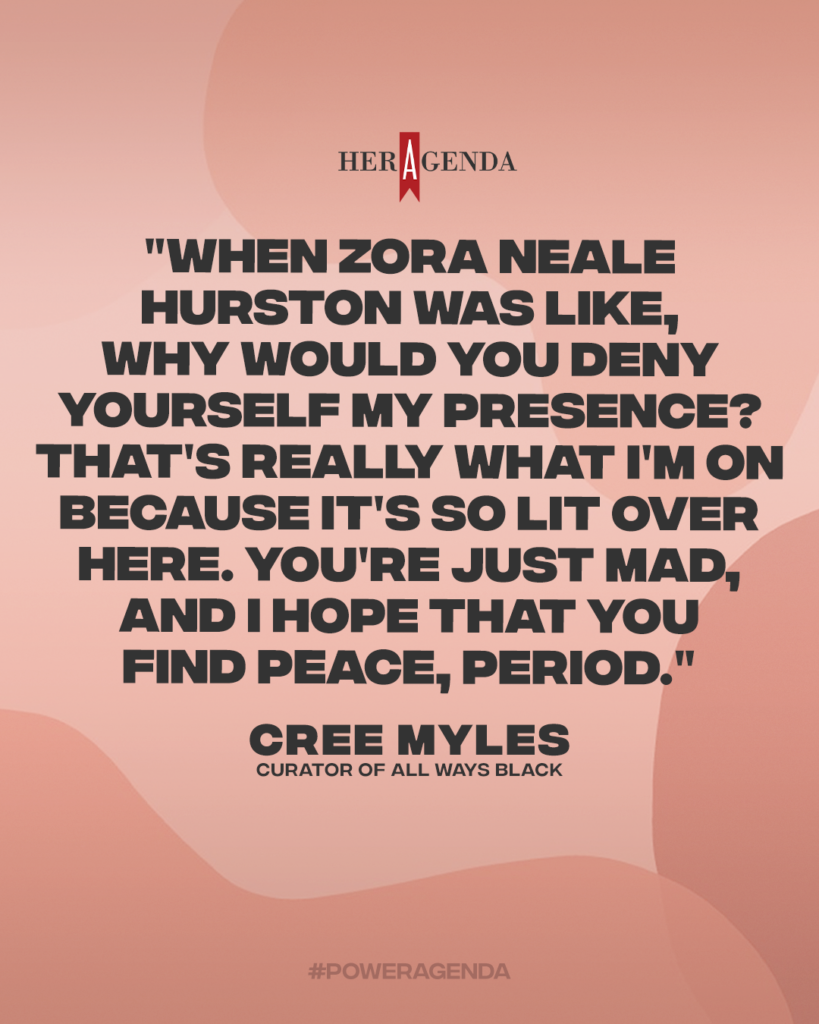
Her Agenda: What is your motto?
Cree Myles: The cliche one is Socrates, excellence is a habit I practice. I say that to myself a lot, and my Blackness is a superpower. I say those things to myself every day. When you have to go into a space where you’re afraid to give all of [yourself] because you don’t know how it will be received, I always say it before those things. It really is personal to me that I just think about the ancestors I [have] who literally did not have the option to show up fully as themselves because they would be putting their lives at risk. All I have to do is be honest, that’s the lowest bar. I’m not risking my life. I’m not changing legislation. All I have to do is tell the truth, that’s easy.
Editor’s note: This interview has been edited for length and clarity. This article is sponsored by Penguin Random House x All Ways Black. All Ways Black aims to help you discover incredible authors and books and support the next wave of Black writers to inspire you indefinitely. We’re partnering to host a giveaway! One lucky winner will have a chance to win a collection of must-have books from some of our favorite authors, a pair of beautiful bookends from Lichen, and a gift card to purchase a new laptop and headphones. Enter for a chance to win. NO PURCHASE NECESSARY. US Residents, 18+. Ends January 30, 2025. See Official Rules at https://bit.ly/3MJkStg

